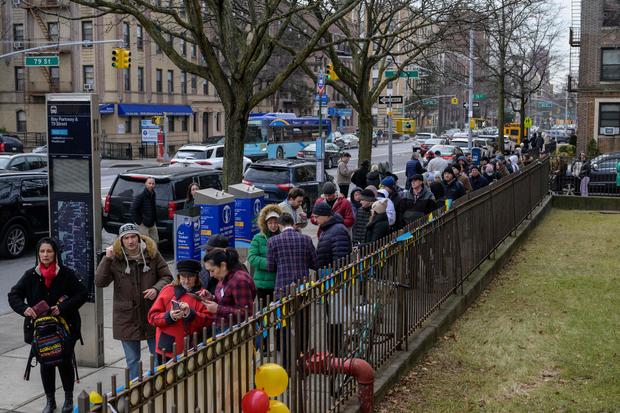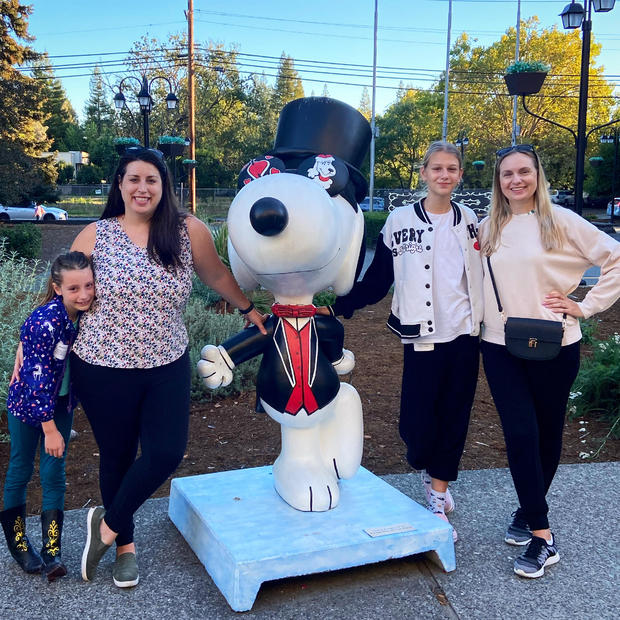A year into war, U.S. sponsors apply to welcome 216,000 Ukrainian refugees under Biden policy
Ukrainian #Ukrainian

Washington — A year into the war in Ukraine, Americans across nearly 10,000 zip codes in all 50 states have applied to sponsor the arrival of more than 216,000 Ukrainians displaced by the Russian invasion of their homeland, according to federal statistics obtained by CBS News.
So far, more than 115,000 Ukrainians have arrived in the U.S. under the sponsorship program, which the Biden administration set up two months after Russian President Vladimir Putin launched a large-scale military offensive against Ukraine on Feb. 24, 2022, triggering the largest refugee exodus in Europe since World War II.
In just a matter of days last year, millions of Ukrainians, mostly women and children, fled the country. While some have returned, eight million Ukrainian refugees remain scattered across Europe, in countries like Poland and Germany, according to the United Nations. Another five million have been internally displaced inside Ukraine.
 Ukrainian refugees wait in line to attend a job fair in the Brooklyn borough of New York on Feb. 1, 2023. ANGELA WEISS/AFP via Getty Images
Ukrainian refugees wait in line to attend a job fair in the Brooklyn borough of New York on Feb. 1, 2023. ANGELA WEISS/AFP via Getty Images
By all measures, the U.S. sponsorship program, called Uniting for Ukraine, is an unprecedented policy, allowing tens of thousands of Americans to facilitate the entry of an unlimited number of refugees through a free and entirely-online application system that, in stark contrast to most immigration programs, adjudicates cases in a matter of weeks or even days.
It has also become one of the main symbols of the Biden administration’s steadfast support to the Ukrainian war effort, which has received billions of dollars in aid and weapons from the U.S. Last week, during a surprise visit to Kyiv, President Biden vowed to continue American assistance to the beleaguered country.
Since it was created in late April 2022, the Uniting for Ukraine program has garnered interest from across the U.S. As of Feb. 21, the U.S. Citizenship and Immigration Services (USCIS) had received 216,210 requests to sponsor Ukrainian refugees from individuals living in 9,766 zip codes in all 50 states, the District of Columbia, and Puerto Rico, according to the unpublished federal data obtained by CBS News.
Two-thirds of the Uniting for Ukraine sponsorship requests have originated in eight states: New York (28,974), Illinois (26,191) California (24,776), Washington (18,546), Florida (14,463), Pennsylvania (12,177), New Jersey (11,395) and Ohio (7,700). But Americans in 13 other states have applied to sponsor more than 2,000 Ukrainian refugees each, and only eight states have fewer than 300 sponsorship applications filed by their residents.
Over half of the applications to sponsor Ukrainians have been filed by individuals in 10 metropolitan areas, including New York City (33,347), Chicago (25,900) and Seattle (12,373). But overall, the government has received sponsorship bids from Americans in over 700 metropolitan areas and cities, the statistics show.
In less than a year, Uniting for Ukraine has become the largest private refugee sponsorship program in U.S. history; though the program’s beneficiaries are not legally refugees. While they are fleeing a war, these Ukrainians don’t have refugee status, which offers a path to permanent U.S. residency. Instead, they have been granted permission to live and work in the U.S. for two years under an authority known as parole.
Many of those sponsoring Ukrainians are members of the Ukrainian diaspora in the U.S., helping their family members and friends. Indeed, the states with the largest Ukrainian-American communities — New York, California, Washington and Illinois — are also the states with the highest number of sponsorship bids.
But Americans with no connections to Ukraine have also signed up to sponsor strangers. Welcome.US, an organization based in Washington, D.C., has connected more 1,500 Ukrainians with American sponsors through an online platform, according to the group’s chief executive officer, Nazanin Ash.
“There are so many types of civic-minded Americans,” Ash said. “It belies what we perceive as the toxicity of our immigration debate. Below the level of the toxicity about the way our politicians talk about immigration is a nation of welcomers who have been looking for an opportunity to be a good neighbor.”
When she heard of Welcome.US’s matching platform last year, Mary-Catherine Oxford, a dean at a community college in northern California, jumped at the chance to sponsor a refugee family, a long-held dream. Through that platform, she met Anna Tereshchenko, a 33-year-old mother hoping to escape Dnipro, a city in central Ukraine targeted by Russian missile attacks.
An IT worker, Tereshchenko had signed up for the matching platform since she lacked ties to the U.S. The two exchanged messages to get to know each other, and after having conversations with her husband, Oxford offered to sponsor Tereshchenko and her 12-year-old daughter. Days after Oxford submitted an application, Tereshchenko and her daughter were approved to come to the U.S. under the Uniting for Ukraine program.
“It’s definitely a leap of faith,” Oxford said about the decision to sponsor and host strangers from half a world away. But Oxford said it was also a leap of faith for Tereshchenko to agree to live with strangers in the U.S.
Tereshchenko and her daughter arrived in the U.S. on Aug. 31, and have been living in Santa Rosa, California, with Oxford, her husband and their 9-year-old daughter ever since. Tereshchenko is currently working part-time at a retail store, while her daughter is learning English at a middle school.
 From left to right: Mary-Catherine Oxford and her daughter, along with Anna Tereshchenko and her daughter. February 2023. Oxford family
From left to right: Mary-Catherine Oxford and her daughter, along with Anna Tereshchenko and her daughter. February 2023. Oxford family
Life in the U.S. has not been easy, Tereshchenko said, noting she has struggled to find a full-time job in her profession. But she said she’s thankful that her daughter is safe in the U.S. As the war rages on, it will become increasingly difficult to return to Ukraine, she added.
“It’s very difficult to start to build a new life and then just have to move somewhere,” she said.
For Oxford, a recent conversation with her daughter demonstrated that she had made the right decision in sponsoring Tereshchenko’s family: “She said, ‘I’m really glad we’re helping people.’ If that’s the lesson my daughter walks away with, that’s successful to me.”
In addition to the Uniting for Ukraine arrivals, an additional 156,000 Ukrainians have entered the U.S. since the start of the war under other immigration pathways, including those with visas or formal refugee status, and more than 20,000 Ukrainians processed along the U.S.-Mexico border last spring, government data show.
In fact, it was the sudden arrival of thousands of Ukrainian refugees to the U.S. southern border last year that prompted the Biden administration to implement the sponsorship policy. After launching the program, it largely stopped processing Ukrainians along the Mexican border, warning that they would be expelled if they attempted to enter the U.S. unlawfully. The number of Ukrainians flying to Mexico subsequently plummeted.
Since then, the Biden administration has used Uniting for Ukraine as a model to reduce illegal border crossings. In January, it announced it would allow up to 30,000 Cubans, Haitians, Nicaraguans and Venezuelans to enter the U.S. legally each month if Americans agreed to sponsor their arrival. At the same time, it said migrants from these countries would be expelled to Mexico if they crossed into the U.S. illegally.
The State Department also unveiled a first-of-its-kind initiative last month that will allow groups of private American citizens to sponsor the permanent resettlement of refugees from all corners of the world through the traditional refugee program. The program is hoping to recruit 10,000 sponsors in the next year.
Unlike other refugee and migrant populations, Ukrainians have largely received a warm welcome and robust bipartisan support in the U.S., including from Republicans who traditionally back stricter immigration controls. The rapid arrival of tens of thousands of Ukrainians, however, has prompted some advocates to accuse the Biden administration of favoring certain migrant groups over others.
Biden administration officials have justified the scale and pace of the Uniting for Ukraine process, in part, by saying that unlike other populations, most Ukrainians intend to return home once the war ends — an assessment supported by surveys conducted by United Nations officials.
Mariana, 20, who arrived in the U.S. last July with her mother, said she’s thankful to be living and working in America. Her new life in the Chicago suburbs is “peaceful,” she mentioned. But the young refugee said she wishes to return to Ukraine eventually; though there’s no telling when that will be possible.
“It depends how long the war will continue,” said Mariana, who asked for her surname to be omitted. “I miss my friends. I miss my family. And I miss my home. But it’s still not safe to be there.”
 Mariana and her mother after coming to the U.S. from Ukraine. February 2023. Mariana
Mariana and her mother after coming to the U.S. from Ukraine. February 2023. Mariana
Mariana and her mother, who lived in the western Ukrainian city of Ivano-Frankivsk, were able to come to the U.S. through a Uniting for Ukraine sponsorship bid filed by her aunt in North Carolina. The 20-year-old is finishing up her Ukrainian college studies online, and working as a dispatcher at a trucking company.
While she’s glad to no longer live under constant war sirens and curfews, Mariana said she’s hoping to be able to go back to Ukraine before her permission to be in the U.S. expires in 2024. In the meantime, she said she’s rooting for her country thousands of miles away.
“I’m very glad that they are not surrendering, and I hope that with the help of Europe and America, the war will end soon,” she added.
More Camilo Montoya-Galvez